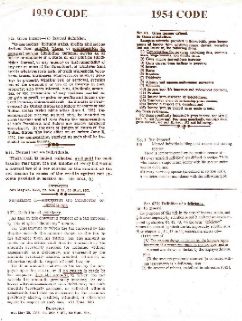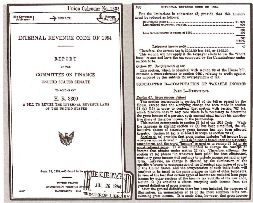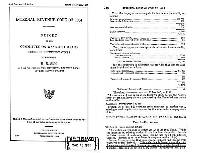1939 & 1954 Codes, Comparison
COMMISSIONER OF INTERNAL REVENUE V. GLENSHAW GLASS CO. 348 U.S. 426
NO. 199. ARGUED FEBRUARY 28, 1955 - DECIDED MARCH 28, 1955 - 211 F.2D
928, REVERSED.
FN9 68A STAT. 3 ET SEQ. SECTION 61(A) OF THE INTERNAL REVENUE CODE
OF 1954, 68A STAT. 17, IS THE SUCCESSOR TO SEC. 22(A) OF THE 1939
CODE.
FN10 H.R. REP. NO. 1337, 83D CONG., 2D SESS. A18; S. REP. NO. 1622,
83D CONG., 2D SESS. 168.
FN11 IN DISCUSSING SEC. 61(A) OF THE 1954 CODE, THE HOUSE REPORT
STATES:
"THIS SECTION CORRESPONDS TO SECTION 22(A) OF THE 1939 CODE. WHILE
THE LANGUAGE IN EXISTING SECTION 22(A) HAS BEEN SIMPLIFIED, THE ALL
INCLUSIVE NATURE OF STATUTORY GROSS INCOME HAS NOT BEEN AFFECTED
THEREBY. SECTION 61(A) IS AS BROAD IN SCOPE AS SECTION 22(A).
"SECTION 61(A) PROVIDES THAT GROSS INCOME INCLUDES 'ALL INCOME FROM
WHATEVER SOURCE DERIVED.' THIS DEFINITION IS BASED UPON THE 16TH
AMENDMENT AND THE WORD 'INCOME' IS USED IN ITS CONSTITUTIONAL SENSE."
H.R. REP. NO. 1337, SUPRA, NOTE 10, AT A18.
A VIRTUALLY IDENTICAL STATEMENT APPEARS IN S. REP. NO. 1622, SUPRA,
NOTE 10, AT 168.
MR. JUSTICE DOUGLAS DISSENTS.
MR. JUSTICE HARLAN TOOK NO PART IN THE CONSIDERATION OR DECISION OF
THIS CASE.
..END :
Income in the Constitutional Sense
Click on the images to see an enlarged version
1939 & 1954 Codes, Comparison
Click on the images
Q. Why did Congress find it necessary to remove the words Salaries, wages, and compensation for personal services from Section 61?
A. They had to change it to make it conform to the 16th amendment to the Constitution.
Click on the image to see what else they changed.
By changing the words they changed the meaning even though they said they didn't.
Why else would they remove those words?
Those particular words...
Salary Wages Personal, hm...
To save space?
See the House & Senate Reports below which state that the term income is used in it's "Constitutional Sense"
Click on images to see enlarged version (click here to print)
 | ||||
 | ||||
The IRS relies on this case to illegally impose the income tax on folks that are not legally liable for the tax. This case was settled in March of 1955, but they decided it using the 1939 code instead of the newly enacted 1954 code. Footnote 11 of this case repeats the intent of congress as seen in the House and Senate Reports, above. Therefore the government has been knowingly scamming us with this ruling for the past 50 years.
Income in the "Constitutional Sense" is the only type of income that is legally taxable.
Income in the Constitutional Sense
Does this Court have the authority (i.e. the jurisdiction) to compel the payment of an alleged tax for which no statute makes Defendant 'liable'"? The answer is obvious: this Court can have no authority to compel Defendant to pay an alleged tax for which Congress passed no law making him "liable." As a matter of fact, if Defendant paid such a "tax," the Government would have been obliged under the law- to refund any amount so paid.Section 6401(c) entitled, "Rule where no tax liability," states as follows.
An amount paid as tax shall not be considered not to constitute an overpayment solely by reason of the fact that there was no tax liability in respect of which such payment was paid.
Since there is a double negative in the statute, the statute is practically impossible to understand unless the double negatives (which cancel themselves out) are omitted. Omitting the double negatives, we find the statute says: "An amount paid as tax shall be considered to constitute an overpayment solely by reason of the fact that there was no tax liability in respect of which such amount was paid." Therefore, under the law, if one pays a federal tax under the misconception that he is "liable" for the tax, the law provides that such a payment constitutes an "overpayment." Section 6402 (a) provides that such "overpayments" must be refunded to taxpayers. It provides, in relevant part, "In case of an overpayment. The Secretaryshall, subject to subsections (c), (d), and (e), refund any balance to such person." (Emphasis added.)
Read the entire document in pdf here


